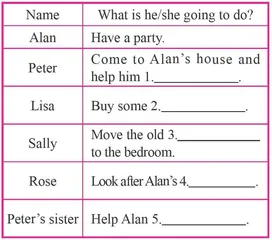Unit 3 Could you please clean your room?

◢ 知识巩固 ◣
I 根据汉语提示及句意填写单词。
1. The children are picking up the
(垃圾) in the park.
2. Children (打扫) the rooms in the
old people’s home yesterday.
3. There are some dirty clothes on the
(地板) in his bedroom.
4. Tom’s room is really in a (不整洁).
5. Mary, could you do the dishes? I am
(折叠) the clothes.
Ⅱ 用方框中所给短语的适当形式填空。
take out get a ride at least
make one’s bed work on
1. My father is a writer. He is
a new book.
2. John, please your
dictionary from the schoolbag and look up
the new word.
3. We tried to into town
when we missed the bus.
4. Try to eat a cup of milk
a day.
5. Mary often and cleans
her bedroom.
◢ 能力提升 ◣
Ⅲ 阅读理解。
The Simpsons is a famous cartoon. It tells about the happy life in an American family. What
chores does each of them like and dislike?
Homer is the father of the family. He likes sweeping the floor. He often weeds (除杂草) in the
garden and washes the car. He never feeds their dog or cooks meals for his family.
Marge is the mother of the family and she is very busy. She always cooks meals, does the
laundry and cleans the house. She never washes the car or changes light bulbs (灯泡).
Lisa is the elder daughter of the family. She likes making her bed. She cleans the table and does
the dishes every day. She can’t cook meals but she is a good helper for her mother.
Bart is the son of the family. He only likes feeding their dog and walking it outside. He never
cleans his bedroom.
( )1. Where do the Simpsons come from?
A. The UK. B. Canada. C. The US. D. France.
( )2. What chores does Homer never do?
A. Feeding the dog. B. Sweeping the floor.
C. Washing the car. D. Weeding in the garden.
( )3. Who cooks the meals in the kitchen?
A. Homer. B. Marge. C. Lisa. D. Bart.
第一课时 (Section A 1a—2d)
扫码跟读
( )4. What does Lisa like doing?
A. Cleaning the table. B. Making her bed.
C. Sweeping the floor. D. Walking the dog.
( )5. What do we know about Bart?
A. He is a good helper for his mother. B. He likes feeding the dog.
C. He sometimes cleans his bedroom. D. He often washes the car.
第二课时 (Section A 3a—3c)
◢ 知识巩固 ◣
I 根据首字母及句意补全单词。
1. My brother’s s goes well with his
coat.
2. Can you stop t the ball for a
minute and help me find the key?
3. I never learned to swim and n did
my sister.
4. What a m you made! You’d better
clean it up before Mom gets home.
5. Could you take out the r when you
leave?
Ⅱ 课文精编巧练。
Last month, our dog welcomed 1.
(I) when I came home from school. He wanted
a walk, 2. I was too tired.
I 3. (throw) down my bag and
went to the living room. 4. minute I
sat down in front of the TV, my mom came
over. “Could you please take the dog for a
walk?” she asked.
“Could I watch one show first?” I asked.
“NO!” she replied 5. (angry). “You
watch TV all the time and never help 6.
around the house!” I got angry too and shouted
back.
My mom did not say anything and walked
away. For one week, she did not do any
housework and 7. did I. Finally, I
could not find clean 8. (dish) or clean
shirts.
The next day, my mom came home from
work to find the house clean and tidy.
“What happened?” she asked in 9.
(surprised).
“I’m so sorry, Mom. I finally understand that
we need to share the housework 10.
(have) a clean and comfortable home,” I replied.
◢ 能力提升 ◣
Ⅲ 完形填空。
My mother is a doctor. She is unable to get back home on time every day. And she has to work
on weekends sometimes. So it’s hard for her to do all the 1 after work.
As a member of the family, I think it’s my duty (责任) to 2 some housework. Though
Mom always says she doesn’t need any help, there are always things I can do. For example, I can
help do the dishes and set the table. I’m sure Mom loves me 3 to help her.
What’s more, I’m trying to be 4 . I wash my own clothes, tidy up my bedroom and take
care of my things. I’m old enough to do these things.
Always show your 5 to your mom for everything she does. I believe she will feel sweet.
Try it now.
( )1. A. schoolwork B. chores C. training D. exercises
( )2. A. share B. make C. find D. provide
( )3. A. volunteering B. asking C. planning D. learning
( )4. A. independent B. creative C. special D. important